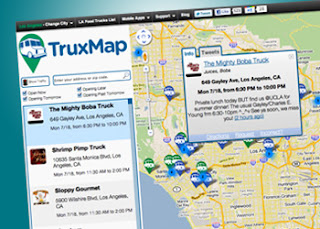 |
| Most food trucks advertise their social networking sites on the truck itself! |
 |
| An example of a site made exclusively to track food trucks |
It is not surprise that social networks have made such a difference in the food truck industry because food trucks are known for their creativity and fun personalities, which they can convey to everyone through these sites. Other forms of material culture such as television have also made the craze more relevant with TV shows such as The Great Food Truck Race, in which there are different food truck teams (all different cuisines) competing each other for popularity and profits on a race across the country (watch the trailer). As we can see, the success of the food food truck relies heavily on their ability to actively engage their customer base through social media in addition to their growing exposure on television and more traditional media.

No comments:
Post a Comment